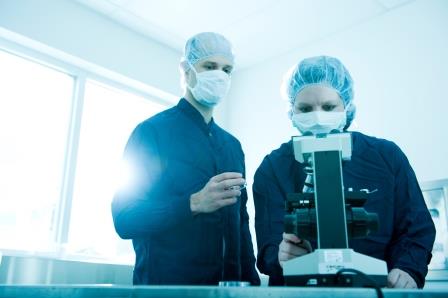New centre at Monash triggers Australia’s medical technology revolution
A $26-million research centre designed to develop new vaccines and improve drug delivery and disease detection, officially opened in Melbourne this past August.
Funded by the Australian Research Council (ARC), the ARC Centre of Excellence in Convergent Bio-Nano Science and Technology is based at Monash University’s Monash Institute of Pharmaceutical Sciences (MIPS).

A rapidly emerging field revolutionising therapy in a wide range of diseases, bio-nano science brings together biological research with various fields of nanotechnology.
The technical approach to biology will see scientists at the Centre use nano devices and nanoparticles to improve human health in four key areas: new vaccine development, drug delivery systems, imaging technologies and disease detection.
Professor Tom Davis, who was appointed earlier this year under the Monash Warwick Alliance, as Director of the Centre, said bio-nano science is a relatively new field, but one with extraordinary potential.
“Nanoscale entities with dimensions thousands of times smaller than the width of a human hair are the essence of all living systems. If we are to better understand, treat and diagnose diseases we need technologies with nanoscale precision,” Professor Davis said.
“We have the opportunity to trigger a biotech and medical technology revolution in Australia. By bringing together some of the country’s leading researchers and combining this with cutting edge technology, the Centre will help turn this vision into a reality.”
Officially opened by ARC Chief Executive Officer Professor Aidan Byrne, the Centre will see researchers work closely with industry partners to translate research, potentially resulting in new diagnostics, drugs and vaccines for a range of conditions including HIV, cancer and malaria.
The Minister for Education the Hon. Christopher Pyne MP approved $285 million in funding over seven years for the ARC Centres of Excellence scheme last year. In total, the funded Centres will collaborate with 106 partner organisations from 44 different countries, receiving more than $392.2 million cash and in-kind support from participating organisations.
Vice-Provost (Research), Professor Pauline Nestor, said the ARC funding builds on Monash University‘s strengths in biotechnology, medical and health sciences.
“This vital support from the Australian Research Council focuses efforts to address some of the most devastating diseases and complex scientific challenges,” Professor Nestor said.
“This Centre will unite Australia’s bio-nano research activity, bringing together universities, research agencies, institutes and companies, helping Monash build on our strengths and translate our expertise to contribute to the growth of industry and research, both in Australia and around the world.”
Collaborating and partner organisations of the Centre include the University of Melbourne, the University of New South Wales, the University of Queensland, the University of South Australia, Australian Nuclear Science and Technology Organisation, Imperial College London, Memorial Sloan-Kettering Cancer Center, Sungkyunkwan University, the University of Nottingham, the University College Dublin, the University of California Santa Barbara, the University of Warwick and the University of Wisconsin-Madison.
Formed in early 2012, the Monash Warwick Alliance represents an innovation in higher education and research and aims to accelerate the exchange of people, ideas and information between Monash and Warwick Universities.
*

































Ask A Question
Ask us about your program of interest, or if you have a question about our services.
CONTACT US TODAY